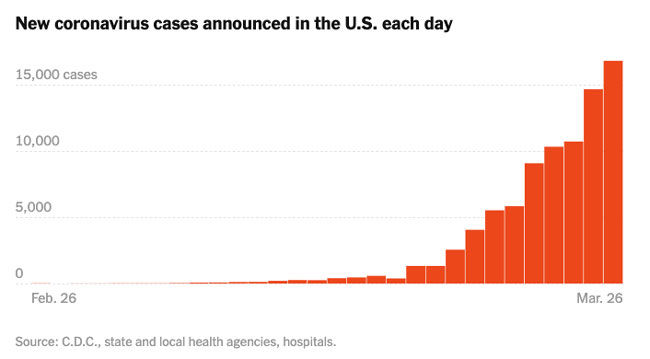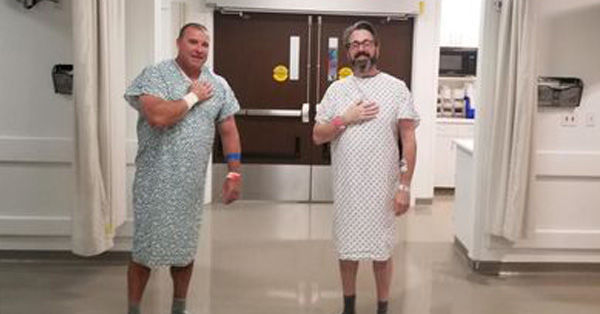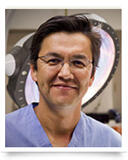Video Interview: Is Heart Valve Surgery an "Elective" Procedure During the COVID-19 Crisis?
Published: March 24, 2020; Page Last Updated: September 17, 2020
The surge in COVID-19 cases has forced hospitals in the United States and abroad to postpone elective surgeries. As seen in the chart below, there have been over 20,000 new coronavirus cases within the United States in the past two days alone, according to the Centers for Disease Control and Prevention.

Considering the unique progression of heart valve disease and the sensitivity of timing heart valve operations, patients are asking me, "Is heart valve surgery an elective procedure?" and "Are cardiac centers still performing heart valve replacement and heart valve repair surgery for conditions including severe aortic stenosis and severe mitral regurgitation?"
To answer these critical questions, I contacted Dr. Marc Gillinov, the Chairman of the Department of Cardiothoracic Surgery at the Cleveland Clinic.

Dr. Marc Gillinov (Cleveland Clinic)
Luckily, Dr. Gillinov agreed to connect with me online for a live "Questions & Answers" session about heart valve disease, COVID-19 and elective procedures. Here are the highlights from my video interview with Dr. Gillinov. (A written transcript of this video has been provided below for the hearing impaired members of our community.)
Key Learnings from Dr. Gillinov
During our interview, Dr. Gillinov provided several important learnings specific to heart valve surgery, elective procedures and COVID-19 including:
- Dr. Gillinov continues to perform heart valve operations at the Cleveland Clinic. Today, in fact, Dr. Gillinov is performing a robotic mitral valve repair for Larry Manshel, a HeartValveSurgery.com community member.
- An "Essential Surgery" versus "Non-Essential Surgery" consideration is critical to determining which patient cases proceed to surgery as hospitals conserve resources for the anticipated rise of COVID-19 patients. As Dr. Gillinov stated, "We're thinking of it as essential versus non-essential surgery. Not meaning a surgery gets to be done or not done. Essential that the procedure be done now versus not essential that it be done now. The reason to put surgery on hold is primarily to conserve resources for when we anticipate maybe a huge influx of very sick patients. That's personal protective equipment, blood, operating rooms, ventilators and staff. We want to be ready to care for people who are critically ill."
- The Cleveland Clinic team evaluates each patient case specific to (i) the risk of delaying surgery and (ii) the symptoms that patients may experience during the upcoming eight-week period. As Dr. Gillinov says, "The question is can we wait on this operation by eight weeks? Are we going to increase the patient's risk? A bad outcome? Or, are we going to subject the patient to eight weeks of severe symptoms?"
- For patients who had their surgeries postponed, Dr. Gillinov stated, "If patients had their surgeries postponed and symptoms are getting worse (you're getting short of breath, a lot of swelling of the ankles), I would contact your surgeon or cardiologist and let him or her know that you're getting worse - meaning the delay may be costing you. On the other hand, if your surgery has been postponed because it was deemed that it's not essential to do it right now, then you're fine to keep doing what you're doing."
- Specific to COVID-19, Dr. Gillinov's advice for valvular patients is the same advice for patients without valvular disease. He stated, "With valvular disease patients, I have the same advice for patients without valvular disease. Do everything that your local and state governments are recommending -- meaning wash your hands, social distancing to the point of isolation if you are sick. If you follow the principles – social distancing, washing your hands, and if you are sick, isolate yourself from others – you will help yourself and your family, friends, acquaintances, and anyone you encounter."
John & Larry Have Heart Valve Surgery Today
As you can see in the picture below and in the new post, "In Difficult Times, John & Larry Inspire Us", Larry Manshel is scheduled for a robotic mitral valve repair surgery by Dr. Gillinov today. Also... John Roland is scheduled for an aortic valve replacement by Dr. Eric Roselli at the Cleveland Clinic today.

John & Larry Have Heart Valve Surgery at Cleveland Clinic
On behalf of the patients in our community and around the world, many thanks to Dr. Marc Gillinov and the entire team at the Cleveland Clinic for being on the front-line of the coronavirus pandemic. We can not thank you enough!!!
Keep Learning About COVID-19
- Free eBook: Advances in COVID-19 & Heart Valve Therapy
- Dr. Stewart's Advice for Heart Surgery Patients During Coronavirus Pandemic
- In New York, COVID-19 Will Not "Break" Dr. Craig Smith
- 20 Facts about COVID-19 & Heart Valve Disease
- Doctor Q&A: How Is COVID-19 Treated?
- Social Distancing: 5 Reasons It Can Prevent Coronavirus Spread
- COVID-19 Surgeon Roundtable: An International Perspective
Video Transcript
Adam Pick: Hi, everybody, it's Adam with heartvalvesurgery.com, and this is a COVID-19 update. As you are all aware, this is a very difficult and trying time for the entire world including the members of our community, and we've had several questions come in to us. I wanted to bring Dr. Marc Gillinov into the conversation. He's live from Cleveland Clinic. Dr. Gillinov, are you there?
Dr. Marc Gillinov: Yes, I am, hi.
Adam Pick: Thanks for being with us. So everybody on the phone knows, Dr. Gillinov is the chairman of the Cleveland Clinic, specifically the Department of Cardiothoracic Surgery. He's also the co-author of Heart 411. He has performed several surgeries on patients in our community. Dr. Gillinov, very quickly, maybe you can just share with our folks your dedicated commitment to valvular therapy in your own practice.
Dr. Marc Gillinov: Here at the Cleveland Clinic, we do all kinds of heart surgery, of course, about 4,500 operations a year, which makes us the busiest center in North America. The majority of our operations are for heart valve disease and of course, we have continuous therapies on TAVR and MitraClip, but we do an enormous number of mitral and aortic valve operations. My particular interest is robotic mitral valve surgery, specifically robotic with care where in appropriate patients, we can make a little incision like this and you get all the work done through a tiny incision and speed to recovery.
Adam Pick: Dr. Gillinov, we've been working together now for probably about ten years, and I can't thank you enough, not just for the cure that you've provided in the past but also for being on the front line in this very, very difficult and trying situation with COVID-19. I wanted to thank not just you but your entire team for all the care that they're providing to the patients out there who so desperately need it at this time. Maybe we can talk now a little bit about COVID-19. We've obviously seen a surge here in the United States in cases. We've seen a lot of confusion about treatment and therapies. This is really a session for us to answer some of the really big questions that have come in from our patients around the world. The first question, Dr. Gillinov, I wanted to ask you was can you please discuss all about the risk factors of patients with heart valve disease, aortic stenosis, mitral regurgitation. Are folks with these diseases at any higher or lower risk to get infected with COVID-19?
Dr. Marc Gillinov: Certainly people with untreated or uncorrected heart valve disease are at increase risk. I'm not talking about mitral valve prolapse where your valve works great. It just has a little bit of prolapse. If you've got severe valve dysfunction but hasn't been fixed – aortic stenosis, mitral regurgitation, mitral stenosis, etc. – then you are at increased risk for complications if you do get infected by COVID.
Adam Pick: When you mention complications, Dr. Gillinov, which complications might those be if you know at this time? Dr. Marc Gillinov: The most prevalent serious complication is pulmonary failure, ARDS, or adult respiratory distress syndrome, and it appears that people who have co-morbid conditions, meaning other disease like heart disease, are at increased risk for developing pulmonary or lung failure if they get infected by the Coronavirus.
Adam Pick: Got it. Another question beyond the risk factors for patients who have not been treated, are there questions coming in from patients who have been treated? Those are the patients who may've already had an aortic valve replacement, a mitral valve repair. Are those patients – one of the questions I've been seeing here, are patients who've already had a device implanted, are they also at more risk than patients who've in the general population? Dr.
Marc Gillinov: That's a great question. We don't have data to answer that, but here's what I think is true. I think if you have normal heart function and you have normal heart rhythm and you've been treated with a valvular procedure, whether it's aortic valve or mitral valve, normal heart function, normal heart rhythm and you can treat it, you're probably about the same risk as the general population of both getting Coronavirus and having problems with it. If you've been treated and you have heart failure, reduced heart function, other cardiac problems, then you'll likely fall into a different risk category. Those patients, even though they've been treated and are being treated, have some increased risk of complications if they get infected.
Adam Pick: When it comes to the question of treatment, we saw last week a shift almost in care for patients specific to elective surgery. There was a recommendation in the news that elective surgeries should be put on hold and that raised a lot of questions for the patients in our community. Before we get to that, can you share why elective surgeries have been put on hold?
Dr. Marc Gillinov: We're thinking of it more as essential versus nonessential surgery, not meaning a surgery gets to be done or not done, essential that it be done now versus not essential that it be done now. The reason to put them on hold primarily is to conserve resources for when we anticipate maybe a huge influx of very sick patients. That's personal protective equipment, blood, operating rooms, ventilators, and staff. We want to be ready if necessary to care for people who are critically ill. Therefore, for what we've decided on a case-by-case basis is nonessential, not meaning you don't need surgery but you're going to be fine waiting, we are waiting.
Adam Pick: Dr. Gillinov, let's relate that now to the valvular population which the progression of the disease, as you know much better than me, can take years to occur and it can go from mild to moderate to severe. There are certain optimal times when surgery is recommended. I guess the big question that patients are having right now is valvular surgery, it considered to be in that category of procedures that are elective.
Dr. Marc Gillinov: It depends. We actually are undertaking a careful review of every single case. We've gone through the patient records carefully and the question is this for each case. The question is if we can wait on this operation by eight weeks, are we going to increase the patient's risk, bad outcome, or are we going to be subjecting the patient to eight weeks of severe symptoms? If somebody, let's say, has – saw a patient today. He's got severe mitral regurgitation and his left ventricular function, meaning his heart function, has already decreased somewhat and his heart is already enlarged somewhat. I don't want to delay his surgery for two months because there could be a cost to him. He'll get surgery tomorrow, actually. On the other hand, if we see somebody who says, I feel fine; I've been running daily; I have no symptoms; and we do an echo and we say your heart function's completely normal. Yes, you have severe mitral regurgitation, but everything's completely normal. That person can wait a couple months, and it's probably in his or her best interests to wait until all of this passes so that that person doesn't get in the hospital and run the risk of being infected by – in a hospital, there are hundreds of thousand – hundreds to thousands of people so better to wait in that case. It's really a case-by-case decision and for the valve patients at home, if you feel fine and your doctor says your echocardiogram looks great except your valve, you can likely wait. On the other hand, if you're short of breath coming up the front stairs and your ankles are swelling and your echocardiogram shows some early damage to your heart, you should probably get that done.
Adam Pick: Dr. Gillinov, we have seen some patients in our community who have had their surgeries postponed, and for one reason or another, and obviously we don't know exactly what's happening at their hospitals, but what do you recommend for patients who might have some concern? They've been diagnosed with severe heart valve disease. Perhaps they are symptomatic but given the situations of COVID-19 and as you talked about, the constrained resources, what would you recommend to those patients at this time?
Dr. Marc Gillinov: If you've been postponed and your symptoms are getting worse, you're getting short of breath, a lot of swelling of the ankles and what have you, I would contact your surgeon or cardiologist and let him or her know, I'm getting worse, meaning this delay is costing. On the other hand, if your surgery's been postponed because it was deemed that it's not essential that we do it right now, then you're going to find keep doing what you're doing, of course, in relative social isolation, but that doesn't mean you can't exercise, especially the mitral valve patients. Mitral valve patients are often told don't exercise. You can. You can exercise. I'm sure of it.
Adam Pick: I have one final question for you. If there's one thing that I know about you individually as a person is you really are the type of surgeon who advocates for their patient on every level, before the surgery, obviously during the surgery with your incredible skill sets there, and after the surgery. We've had many conversations about cardiac rehab. I guess the big, big, big-picture question that I ask you on behalf of our community is what advice do you have or tips of advice or best pieces of advice that you have for patients with valvular disease at this time?
Dr. Marc Gillinov: With valvular disease, same advice as without valvular disease. Do everything that your local and state governments are recommending, meaning wash your hands, social distancing to the point of isolation if you are sick. My biggest fear is as I leave the house and everyone's at home, am I going to bring the illness to my home and if I do get sick, I'm going to isolate myself because while almost everyone recovers from this, there's some who don't. If you follow the principles – social distancing, washing your hands, and if you are sick, isolate yourself from others – you will help to help yourself but your family, friends, acquaintances, and anyone you encounter.
Adam Pick: Thank you so much, Dr. Gillinov, for your time today, for the care, again, for your team, everybody there at the Cleveland Clinic, and for your ongoing commitment to facilitating the health of people and their heart valves, their cardiac conditions. Can't thank you enough and I just want to, again, share our appreciation for you and your entire team there. Thank you for being with us today and we will be talking to you in the future. Dr. Marc
Gillinov: My pleasure.
Adam Pick: Alright, thanks, Dr. Gillinov.
Dr. Marc Gillinov: You're welcome. I’m going to go operate in a little bit. We are still open for business.
Adam Pick: Alright, great, and everybody, we'll be going ahead and putting up a slide after this. We have all the information for Dr. Gillinov, so you can reach out to him if you'd like to contact his office. Thanks again, Dr. Gillinov.
Dr. Marc Gillinov: Welcome. Have a good day.





